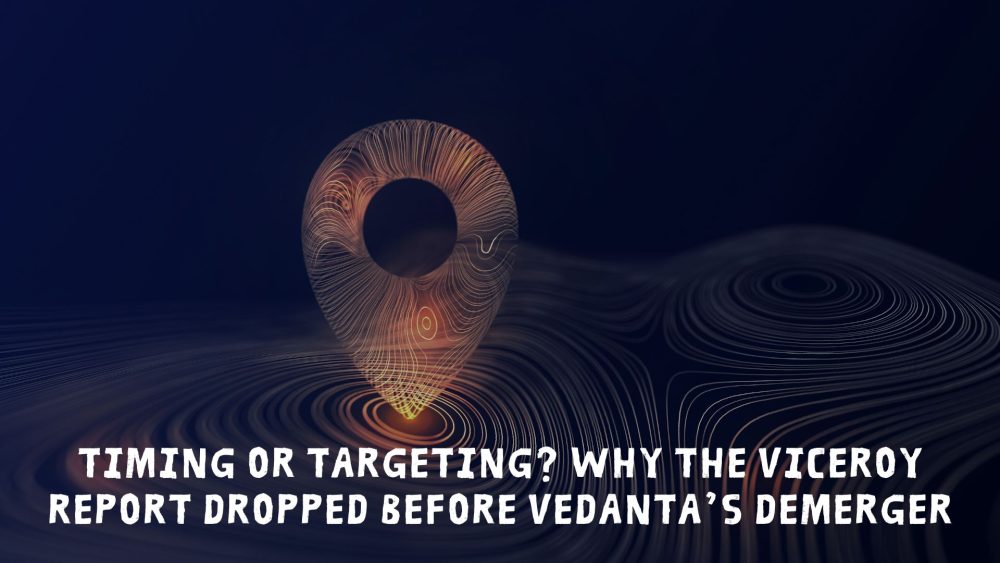In the high-stakes world of business and finance, timing plays an important role. Whether it’s a product launch, an earnings report, a merger/demerger, or even a news leak, the time at which the news went viral is important. That’s exactly what happened with the Vedanta Limited, which has been roped into the false allegations made in the Viceroy Research report, which was published in July 2025. Viceroy has made allegations against Vedanta Resources Limited (VRL), the parent company of Vedanta Limited, just weeks before the company’s much-anticipated corporate demerger.
The proposed Vedanta demerger is amassive move aimed at restructuring the company into five independent entities and unlocking greater shareholder value. So the real question is this just a coincidence, or was Vedanta being targeted?
All About the Viceroy Report?
Viceroy Research, a US-based forensic financial research firm known for taking short positions, released an 87-page report making serious allegations against Vedanta Resources Limited.
VRL was accused of the following aspects:
- Having an unsustainable debt burden (nearly $4.9 billion),
- Relying on high dividends from Vedanta India to meet its obligations,
- Creating what it described as a “Ponzi-like structure” where new debt was used to pay off old obligations.
It is quite surprising to know that it is the same Vedanta that has paid over INR 55,000 crores in taxes in FY25 and distributed over INR 17,000 crores in dividends, while maintaining healthy cash flows and ever higher profits since the past decade.
The Right Strategy- Timing Before the Demerger
Just days before the Vedanta Viceroy report was released, Vedanta was preparing for its corporate demerger, a strategic restructuring plan to split the business into five focused, independently listed companies:
- Vedanta Aluminium
- Vedanta Oil & Gas
- Vedanta Power
- Vedanta Iron and Steel
- Vedanta Limited (holding entity)
Vedanta, through this strategic move, aimed to attract sector-specific investors, enhance operational transparency, and unlock the shareholders’ true value. With regulatory approvals in place and positive market anticipation, the demerger was seen as a value creation exercise for both domestic and global investors.
Everything was going smoothly and as per the tracks, but then came the Viceroy report with a lot of criticism and allegations against Vedanta.
Short Selling and Market Timing: An Uncomfortable Pattern?
This isn’t the first instance where Viceroy or similar firms have released market-moving reports right before major corporate decisions. Short sellers often publish negative reports and then take positions expecting stock prices to fall, one of the common strategies to tarnish the company’s reputation. But this strategy did not work well with Vedanta, which worked on a fine ethical line and also maintained transparency in its operations. Moreover, the former Chief Justice of India, D.Y. Chandrachud, stated that the Viceroy Report on Vedanta lacks credibility.
The Viceroy report lacks credibility, is full of misleading claims, and causes reputational damage to Vedanta. He further stated that Vedanta has the right to take legal action against the people behind the report.
Besides, leading companies like JP Morgan and BofA Securities (Bank of America) also maintained a positive recommendation on securities issued by Vedanta, due to its strong financial records. What truly sets Vedanta apart is its resilient and focused approach. The company has proposed restructuring, including the upcoming demerger, which is aimed at unlocking value across its business verticals. This forward-looking approach, backed by ethical operations, showcases Vedanta’s ability to rise above short-term challenges.
The trust Vedanta gets from leading global firms clearly states that the Viceroy report lacks credibility, misrepresents financial data, uses defamatory language, and causes reputational harm.
Final Thoughts: Targeted or Just Terrible Timing?
Whether the Vedanta Viceroy report was intentionally timed to derail the demerger or not, one thing is clear: timing, especially when reputations and markets are at stake. For companies like Vedanta, it is a clear reminder to always stay prepared for unexpected headwinds — and to respond with facts, not fear.
For investors, it’s a case study in staying calm, reading both sides, and not reacting to market rumours because, in the end, Truth stands tall, especially when backed by transparency, resilience, and legal clarity.



